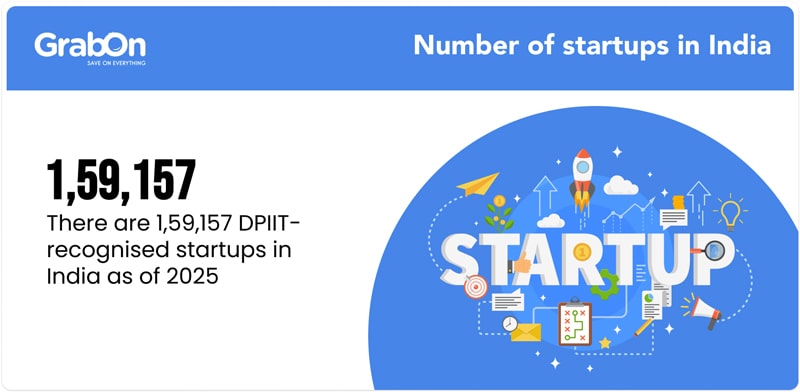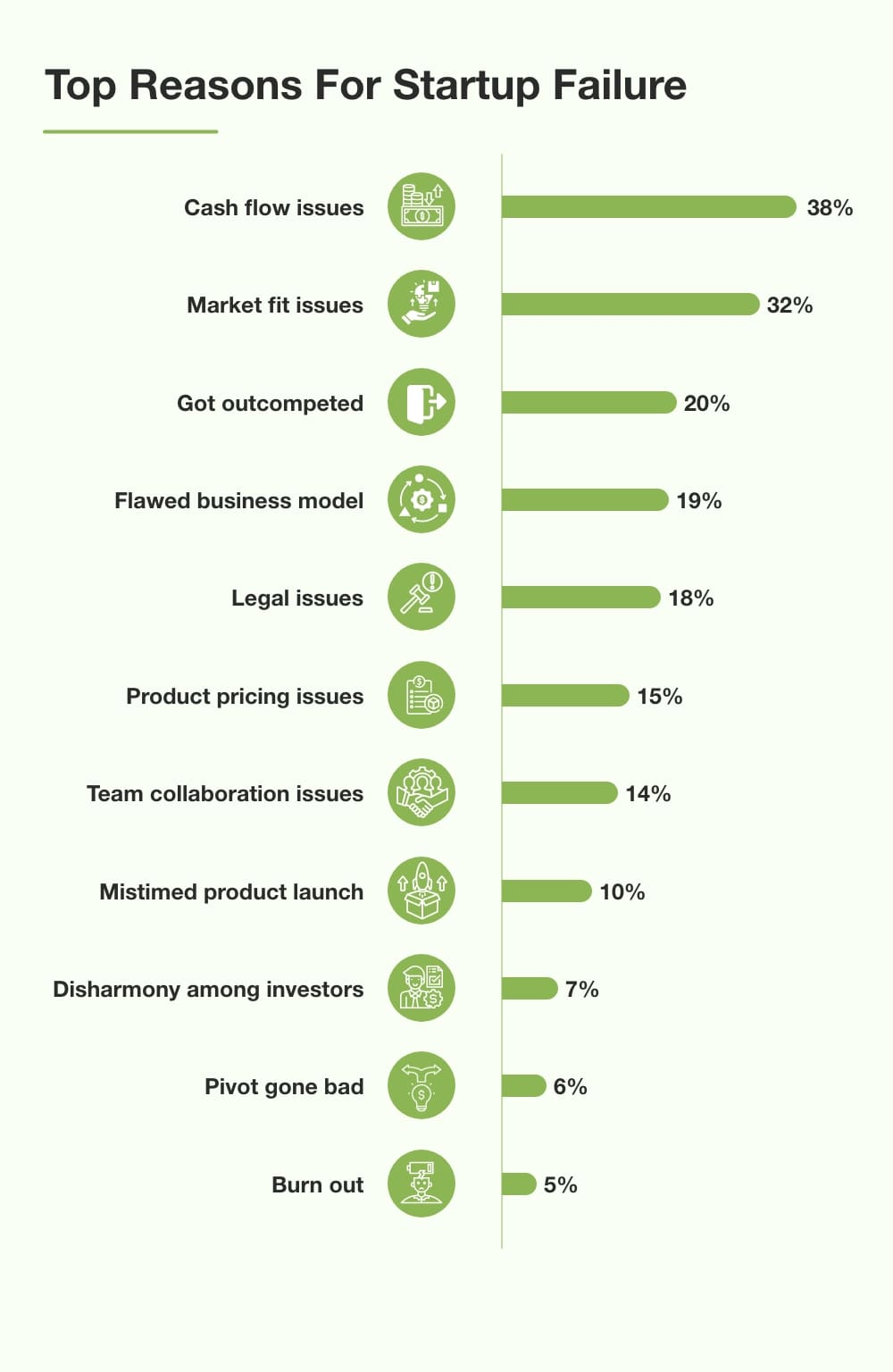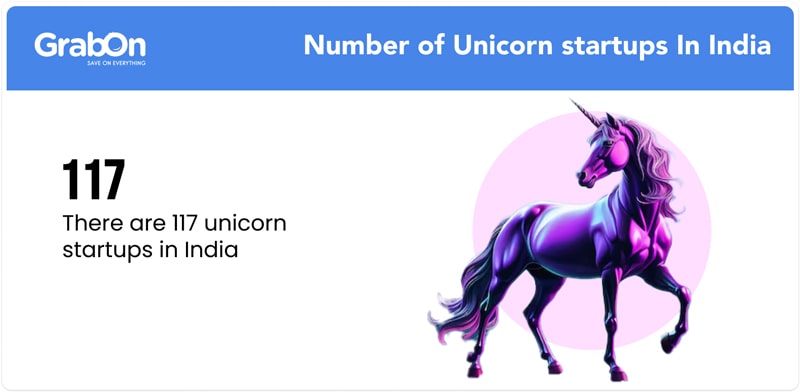According to a report by NASSCOM (the trade association of India), India has emerged as the 3rd largest startup ecosystem globally, with about 1,59,157 startups in 2025. The number is only growing, as the compound annual growth rate of startup funding during the bridge funding stage in 2024 was approximately 76% in the country.
We have put together the most up-to-date insights associated with the Indian startup sector in this post.
Startup Statistics At a Glance
- India has 1,59,157 DPIIT recognized startups as of 2025.
- Indian startups have collectively generated over 16.6 lakh direct employment opportunities since 2016.
- The United States is home to the most number of established startups (83,306) followed by India (17,678)
- Around 31% of Indian startup founders are prioritizing top-line revenue growth for the financial year 2025.
Startup Statistics In Detail
We try to shed light on the startup culture through data-backed reports and their breakdown in this section.
Number of Startups in India (2016 to 2024)
The number of DPIIT-recognised startups has grown from 471 in 2016 to 1,59,157 in 2025. That represents a massive 38,067.1% increase over the last decade and a 24% increase from the previous year.
In this process, the startups have collectively generated over 16.6 lakh direct employment opportunities.

Here is a table showing the number of startups from 2016 to 2025:
| Year | Number of DPIIT recognized startups |
| 2016 | 471 |
| 2017 | 5,704 |
| 2018 | 14,339 |
| 2019 | 25,618 |
| 2020 | 40,116 |
| 2021 | 60,162 |
| 2022 | 86,704 |
| 2023 | 112,718 |
| 2024 | 127,433 |
| 2025 | 1,59,157 |
Source: PIB India.
Jobs created by startups over the years
India’s startup ecosystem has seen explosive growth, with over 1.59 lakh startups recognized by DPIIT as of January 2025. Since 2016, these startups have generated more than 16.6 lakh direct jobs, driving employment across various sectors in the country.
The IT services industry leads with 2.04 lakh jobs, followed by healthcare and life sciences (1.47 lakh) and professional services (94,000).
Major hubs like Bengaluru, Hyderabad, Mumbai, and Delhi-NCR have fueled this momentum while emerging cities are also making a mark.
| Year | Jobs created by Indian startups |
| 2016 | 10 |
| 2017 | 43,322 |
| 2018 | 88,147 |
| 2019 | 132,804 |
| 2020 | 161,796 |
| 2021 | 198,762 |
| 2022 | 238,767 |
| 2023 | 3,91,943 |
| 2024 | 1,78,316 |
Source: Press Information Bureau India.
Startup Failure Rate (Global)
About 10% of startups fail in their first year. Between years two and five, nearly 70% shut down. Data from the U.S. Bureau of Labor Statistics shows that most failed businesses are less than 10 years old.
Only 10% of startups survive in the long run, while 90% eventually fail.
Here is a table showing the startup failure rate:
| Time | Failure Rate | Survival Rate |
| 1st Year | 10% | 90.00% |
| 2nd Year | 20% | 80.00% |
| 5th Year | 45% | 55% |
| 10th Year | 65% | 35% |
| 15th Year | 75% | 25% |
Top Reasons For Startup Failures
38% of Startups fail due to cash flow issues, 35% fail due to poor product-market fit, and 20% fail due to poor marketing strategies. Without a clear demand for their product or service, even the best marketing efforts won’t succeed. Insufficient market research can lead to misguided strategies and missed opportunities and hence failure.
Even successful startups face challenges, but those that conduct thorough market research and implement strong marketing strategies while managing cash flow effectively have a better chance of survival.
That is one of the main reasons behind curating this post and using data to make informed decisions when in your startup phase.

Let’s look at the common reasons why startups fail:
Source: CB insights.
Leading Priority for Startups in 2025
Around 31% of Indian startup founders are prioritizing top-line revenue growth for the financial year 2025, while minimizing cash burn is their least concern this year.
28% of the founders also state that acquiring new customers is their top priority. Operating traffic and market expansion are the top priorities for 19% and 16% of the startup founders respectively.
Source: Statista
Budget allocation to Startups in the 2025-26 financial year
In the 2025 Union Budget, Finance Minister Nirmala Sitharaman announced a ₹10,000 crore infusion into Alternate Investment Funds (AIFs) through the Fund of Funds (FoF) managed by SIDBI, doubling the government’s existing commitment. A separate FoF for deep tech startups is also under consideration.
Startups will continue to benefit from a tax exemption on profits under Section 80-IAC of the Income Tax Act, with the eligibility period extended by another five years. This ensures that startups incorporating later can still claim the three-year tax break.
To improve ease of doing business, tax treatment on long-term capital gains will be standardized for both domestic and foreign investors. Additionally, credit access for startups will be expanded, with loan limits increased from ₹10 crore to ₹20 crore and the guarantee fee reduced to 1% for loans in 27 key sectors.
Source: Government of India.
Number of established startups by Country
United States is the country with the most startups, the nation is home to 83,306 startups as of 2025. India comes in second with 17,678 established startups.
GrabOn takes pride in being one of India’s leading startups in the eCommerce sector.
| Country | Startups |
| United States | 83,306 |
| India | 17,678 |
| United Kingdom | 7,610 |
| Canada | 4,119 |
| Australia | 3,081 |
| Indonesia | 2,822 |
| Germany | 2,553 |
| France | 1,750 |
| Spain | 1,555 |
| United Arab Emirates | 1,393 |
| Singapore | 1,292 |
| Brazil | 1,232 |
| Netherlands | 1,184 |
| Israel | 994 |
| Italy | 990 |
Note: This table has the number of established* startups. Earlier we mentioned India is home to 1,59,157 startups, which is the number of all DPIIT-recognized* startups.
Source: Startup Ranking.
Women In Indian Startups Statistics
Indian women-led businesses have also shown that women in business can match the success of their male counterparts, now 48% of recognized startups have at least one woman director, and here are some statistics to highlight the power of naari shakti in the Indian startup scene.

Women in MSMEs:
- 20.37% of Indian women are MSME owners.
- They contribute to over 23.3% of the labor force.
Economic Impact:
- Increasing women’s participation in the labor force could add $700 billion to the global GDP.
Employment Contribution:
- Women entrepreneurs provide direct employment to 22 to 27 million people (Bain & Co survey).
- By 2030, Indian women entrepreneurs could generate 150-170 million jobs.
Startup Impact:
- DPIIT-recognized startups with at least one woman director have employed 3,90,000 people.
Number of Unicorn Startups in India
A unicorn startup is a company valued at USD 1 billion or more, known for its groundbreaking innovation and market disruption, and India is home to 117 unicorn startups. The most recent addition to this elite group was Money View, which achieved unicorn status on September 12, 2024. As of 2025, no new unicorns have emerged in India.
On the global stage, India ranks third in total unicorns, trailing behind China, which has 244, and the United States, which leads with 1,016. Within India, Bengaluru tops the list with 44 unicorns, followed by Gurugram with 19 and Mumbai with 16. In terms of industry distribution, the consumer sector has produced the highest number of unicorns at 57, with retail following at 34 and fintech at 27.

Source: Tracxn
Startup Funding Statistics At a Glance
- AngelList India, an angel network, is the most active investor in India with a total of 180 deals. AngelList India is a platform that streamlines the investing process for angels and venture capital firms (VCs)
- 51% of the start-ups find the funding experience favorable in India. It was a significant decrease from the previous year. During the same time, 25% of the founders didn’t attempt to raise funds.
- 22% of angel investors state that deeptech and cleantech sectors would see the most venture capital investment. Deeptech refers to technology solutions based on advanced scientific principles and significant engineering innovations.
- 51% of the angel investors say that they have exited more than 50 percent of their investment at the growth stage in India. Only 4% of the angel investors prefer to hold their equity in the startup until the initial public offer stage.
Source: Statista.







